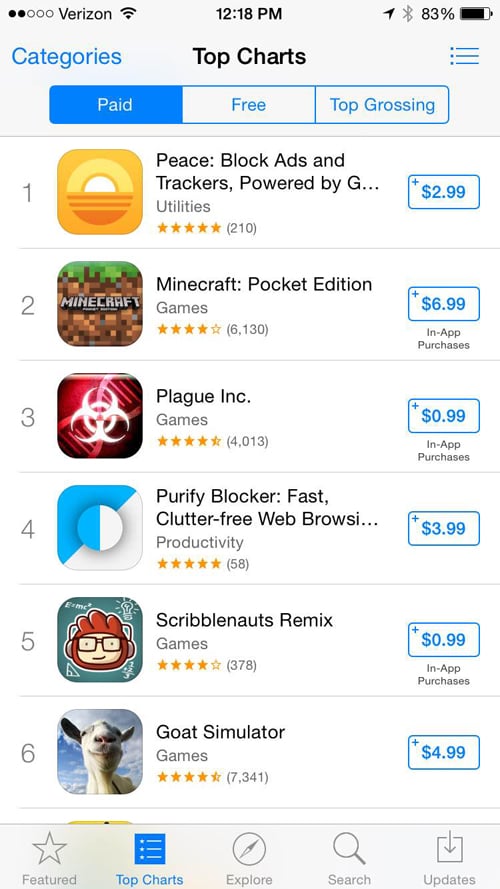 Mobile ad blocking is a disaster for the ad industry. Content blocking is not the harbinger of advertising doom that some speculate it is.
Mobile ad blocking is a disaster for the ad industry. Content blocking is not the harbinger of advertising doom that some speculate it is.
So, which is it?
If the adoption numbers for mobile content blocking apps the day after Apple’s iOS 9 release on Wednesday are any indication, skeptics might have to change their tune.
As of Thursday morning, the No. 1 and No. 4 spots for the US in the iOS App Store were both filled by paid ad-blocking apps.
The top spot was occupied by a Ghostery-powered app called Peace, available for $2.99. And just three spots below it at No. 4 was Purify for $3.99, while Blockr ranked 17th and Crystal ranked 34th. Both sell for 99 cents. [Updated 9/18/15: As of Friday morning, Peace was No. 1, Crystal was No. 2, Purify was No. 5. and Blockr, despite stellar App Store reviews, had fallen off the chart.]
Seems like if you want to enable content blocking on iOS 9, you’re going to have to pay.
As Crystal creator Dean Murphy previously told AdExchanger while his content-blocking app was still in beta, “To make any money off a content blocker there’s not much else you can do because the app itself is not used. It’s just telling Safari what to block. People will download my app, but they will probably never visit it after the initial install.”
Although it’s not 100% clear exactly how many downloads it takes or specifically what ingredients go into the secret sauce that elevates certain apps to the top of the charts in Apple’s app store – a black box every developer in the universe wants to get into – breaking into the top 10 is a meaningful milestone for any app.
That said, a cynical mind might wonder if Apple itself didn’t purposely help push content-blocking apps to the top of the charts to coincide with the iOS 9 launch. When users download the new iOS, what’s the first thing they’re going to do? Look for apps. And what will they find at the top of the App Store “Most Popular” list? Apps to streamline their mobile web experience.
Although ad-blocking king Adblock Plus (ABP) launched its content-blocking app for iOS 9 on Sept. 8, a little over a week before Apple officially released its new mobile operating system, ABP didn’t even break into the top 150 apps in the App Store on Thursday. Separately, ABP is under fire for reportedly taking a cut of revenue in return for allowing certain partners to show ads on iOS 9.
One question floating around the industry is how popular content-blocking apps would actually be upon iOS 9’s release. Would users download them at scale?
The App Store reviews for Peace – of which there were already more than 200 by Thursday morning, and not a single one below five stars – would seem to answer that question with a resounding “yes.”
 As one effusive reviewer noted, and which was echoed in nearly every single Peace review:
As one effusive reviewer noted, and which was echoed in nearly every single Peace review:
“You’ll be amazed how fast websites will load again. … plus, I never agreed to be tracked in the first place. Where’s my cut of what companies are making profiting off my data. I don’t typically have a problem being tracked as long as I see the benefits and agreed to the terms. … I’m taking back control of my identity and it feels good. A no brainer!”
The reviewer makes an important point suggesting that people use ad blockers because a) they improve the user experience and b) there’s no clear value exchange when it comes to data collection.
Publishers rely on ad revenue, but users shouldn’t “feel guilty” about blocking ads, wrote Marco Arment, the developer behind the Peace app, on his blog. He’s also the co-founder of Tumblr and the creator of Instapaper.
“The ‘implied contract’ theory that we’ve agreed to view ads in exchange for free content is void because we can’t review the terms first – as soon as we follow a link, our browsers load, execute, transfer and track everything embedded by the publisher,” Armet noted. “Our data, battery life, time and privacy are taken by a blank check with no recourse. It’s like ordering from a restaurant menu with no prices, then being forced to pay whatever the restaurant demands at the end of the meal.”
As of June, around 11% of mobile users said they regularly use ad-blocking software, according to research from the Reuters Institute for the Study of Journalism at the University of Oxford.
“And this trend is not only for techies,” wrote Ken Sena, senior managing director in the equity research group at investment bank Evercore in a September note to clients. “While there certainly are more tech-savvy users who are looking to shave seconds off website load times, others seem to simply prefer not seeing overt advertisements, something we are hearing more frequently from a millennial audience.”
But maybe not. Although it’s likely that a “fair number” of consumers will use content blockers, Adam Grow, SVP of display at Rakuten Marketing, said he doesn’t think “it will reach considerable mass in countries that have moved to large data plans and fast wireless networks, largely due to inertia.”
That said, the threat is there, lurking in the wings.
“The responsibility continues to fall on ad tech companies and their clients to provide a clean, interactive web where the user experience is enhanced by marketing content, not slowed or interfered by it,” Grow said. “[That way] users don’t have to seek out solutions such as these.”












